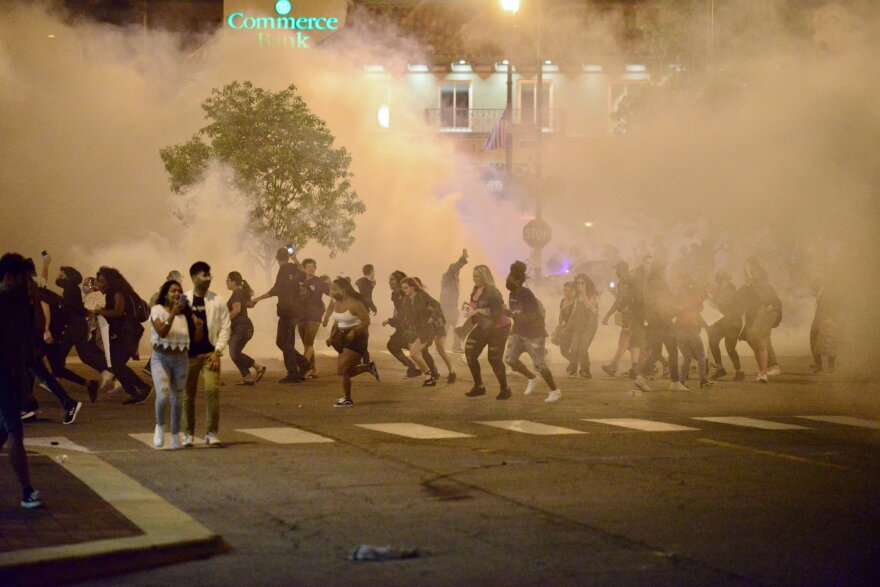Three days of protests in Kansas City sparked by the police killing of George Floyd in Minneapolis came mostly to an end after a curfew went into effect at 8 p.m. Sunday.
Police and a small crowd of demonstrators faced off until late in the evening along a stretch of Main Street between Cleaver Boulevard and 43rd Street.
For most of the day, however, thousands of people demonstrated peacefully for several hours at Mill Creek Park near the Country Club Plaza, where speakers included U.S. Rep. Emanuel Cleaver, who called the protests "good and healthy."
Read about Sunday's demonstrations here.
Early in the evening, one group of demonstrators marched north toward 31st Street and Southwest Trafficway, then looped back down Main Street back to the park.
We have closed numerous roads in the Plaza/Midtown/Westport area to accommodate marching protesters. Vehicles should take alternate routes. We will continue to accommodate peaceful protesters.
— kcpolice (@kcpolice) May 31, 2020
At about 8:30, citing bottles and "items being thrown at officers," police declared the protest "an unlawful assembly" and began using tear gas to scatter the crowd.
Kansas City Mayor Quinton Lucas had imposed the 8 p.m. curfew, which covered the Country Club Plaza, Westport, the downtown business district and all city parks, at noon on Sunday. It was set to lift at 6 a.m. Monday morning.
Three days of protests
Demonstrations began at 3 p.m. Friday at the J.C. Nichols Fountain near the Country Club Plaza and continued for seven hours. Police made five arrests and used pepper spray at one point to scatter people. Streets were closed around the Plaza and protesters threw rocks and bottles, breaking windows in nearby businesses and damaging a few police cruisers.
Read about Friday's demonstrations here.

Protests began again late Saturday afternoon, but by 9 p.m., 85 people had been arrested and police had used tear gas to disperse the crowd. By midnight, windows at several plaza buildings had been broken, a police cruiser had been burned and Missouri Gov. Mike Parson had issued a state of emergency "due to civil unrest" in Kansas City and St. Louis.

Read about Saturday's demonstrations here.
At a news conference as the curfew began to take effect on Sunday night, Lucas said the first step in addressing the concerns he had heard from protesters was to "recruit more minority officers" as well as more officers from different parts of the community.
"There will be more answers but that’s a huge one," Lucas said. "You have to have people who know the community, who know the streets they’re patrolling. And so that to me is probably the biggest thing we can do beyond bells and whistles.”
Lucas also called for more diversity training and more training in de-escalation. He said the Board of Police Commissioners needs to review events in Minneapolis and "have a close study of what is excessive force. How are we training people to do things. Is there a better way? We need to make sure we do that consistently. These are steps, things we can do from tomorrow.”





